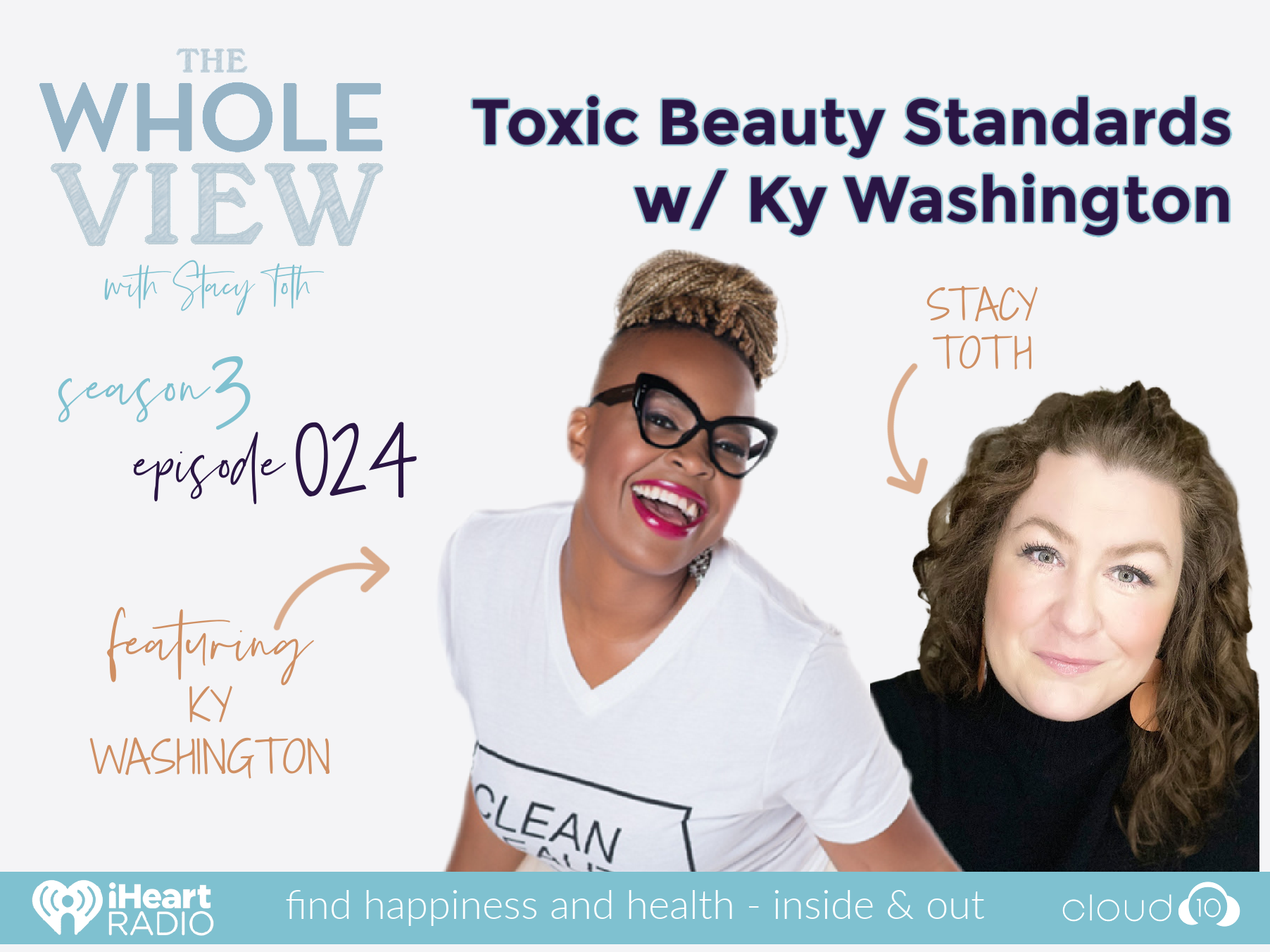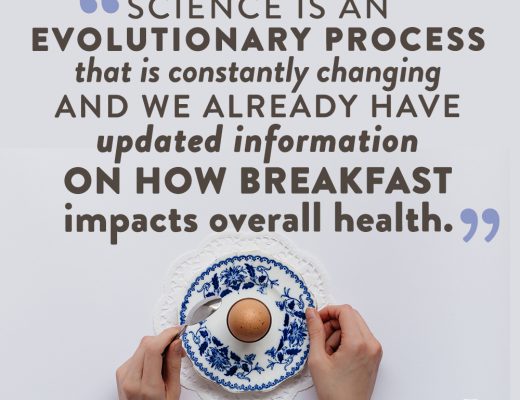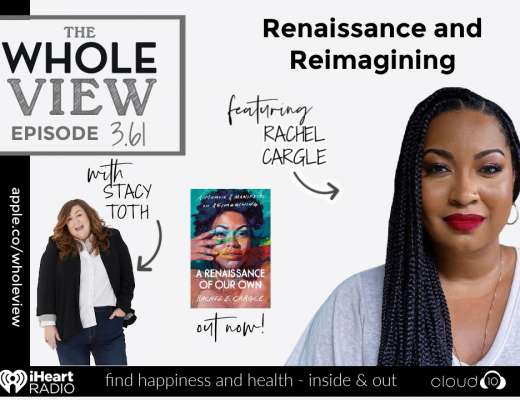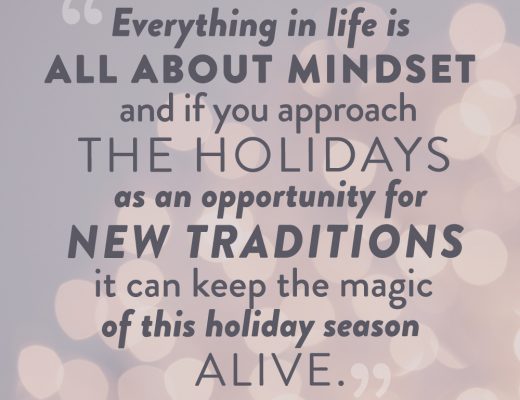Welcome clean beauty expert Ky Washington to the Whole View! This week, Stacy and Ky dive into the toxic beauty standards of the industry and the negative impacts it has on the BIPOC community. Ky shares her experience as a Black Beauty expert, how her journey lead her to becoming a clean makeup artist, and offers actionable steps to allies wanting to help the BIPOC community.

Find Ky:
If you enjoy the show, please leave a review. Letting people know on iTunes or however you listen that it’s worth their time could change someone’s life!
Key Takeaways
Introductions
- Ky is a full-time makeup artist. A few years ago, her health was in peril. She had major trauma to her body and spirit, lost a huge battle with fertility, and suffered numerous health issues.
- She started to not feel well. Ky suffered chronic migraines and was tested many times, but they couldn’t figure out what was going on. Finally, in her adult life, her issues ended up being linked to the products she used.
- She decided to take a holistic approach after going through so many doctors. She made lifestyle changes and started seeing some significant improvements in her health. Then she finally found a fantastic doctor who properly diagnosed her with PCOS.
- Changing the products she was using in her shower, her makeup vanity, and cleaning products in her home dramatically improved her health. But she was still using products on her clients that she would not use herself, which bothered her.
- That decision launched Ky on her journey to becoming a clean makeup artist and advocate for clean beauty.
Toxic Beauty Standards
- Ky has heard many times within the BIPOC Community that if you don’t have your hair natural, people consider it what “non-smart” people do. So, she grew up using relaxers and certain makeup because she was supposed to do that.
- That means that not only are Black individuals buying more, but they’re spending more of their budget and being exposed to more potentially harmful ingredients with the increased amount of products they’re using.
- White supremacy was set up by old white men many, many, many years ago, and it’s still in place. So when we use the term white supremacy, we’re not saying that all white people feel superior to everyone or that you are doing something in particular. It just means that it’s the system that we live in.
- It started in times of slavery, where the lighter you are, the better. Slave women were asked to cover their hair, so women started using head wraps. And they were colorful and beautiful, which attracted male attention and did the opposite of the intention.
- After slavery, “separate but equal” promoted more Eurocentric beauty standards. So that meant straightening your hair, having your hair pressed, doing things for your skin to appear lighter, or just staying out of the sun.
- It is not a coincidence that certain products that cause a lot of harm also affect Black and Brown people.
Topics discussed
According to the Environmental Working Group (EWG), a non-profit dedicated to protecting human health and the environment, Black people make up about 13% of the U.S. population, but their spending accounts for upwards of 22% of the $42 billion-a-year personal-care products industry. This margin suggests that the Black community is buying (and being exposed to) more potentially harmful ingredients than other communities:
One reason for this higher risk is that the hair products, skin lighteners, and nail polishes marketed to this community contain ingredients that are known carcinogens and hormone disruptors.
A December 2019 study published in the International Journal of Cancer found that women who used hair dye or chemical straighteners were at higher risk of developing breast cancer. This link was notably higher among Black women who regularly use products such as relaxers that contain formaldehyde, a preservative that is linked to certain cancers, and feminine hygiene products which often contain phthalates, a known hormone disruptor.
In fact, the EWG’s research found that less than 25% of products marketed to Black women fall into their “low hazard” category. Beauty must do better. Another study from UC Berkeley found that when Latinx teenagers switched to clean beauty products, the levels of parabens and phthalates in their bodies dropped significantly within three days. [source]
These findings show that BIPOC have higher exposure to harmful chemicals in personal-care products, and switching to safer products reduces exposure within a short time.
Products we DO love:
- Black Girl Sunscreen Broad Spectrum – SPF 30 (EWG 2)
- TPH by Taraji Never Salty Sugar Hair & Scalp Scrub (EWG 2)
- Shea Moisture 100% Pure Argan Oil – bonus, black-owned business (EWG 1)
- Sienna Naturals Shampoo & Dew Magic Leave-In Conditioner (bonus: Black-owned) (EWG 2)
- Curls Dynasty, Cocoa Mint Moisture Rich Shampoo (bonus: Black-owned) (EWG 2)
- The Honey Pot Company
- Oui the People razor
- Opulence MD Beauty
find them all on my Target clean product guide - The problem is because there is no regulation on so many products available, the most accessible and affordable things use ingredients known to cause harm. And people have NO idea that the FDA has absolutely no ability to regulate, recall, or anything.
- Stacy has mentioned asbestos in kids’ makeup before– known carcinogens in makeup for CHILDREN. Unfortunately, similar products have consistently been marketed to people of color. In fact, Johnson and Johnson no longer sell talcum in the U.S. and is pulling it worldwide in 2023 because of THIRTY-EIGHT THOUSAND pending cases against them.
Want More? Have Questions?
Want more? Come join the Patreon community! You can support The Whole View podcast and hear what Stacy and her guests really think about the topic in this week’s exclusive and uncensored behind-the-scenes bonus audio. We love connecting with our Patrons! It’s a direct line to submit your questions for upcoming shows. You also get access to some additional cool features like Q&As, voting on show topics and guests, and a quarterly exclusive commercial-free episode.
Studies & Sources
- Study from Berkley
- International Journal of Cancer
- The Link Between BIPOC Women’s Health and Toxic Exposure
- Environmental Working Group (EWG): Big Market for Black Cosmetics, but Less-Hazardous Choices Limited
Products & References
- Fearing Black Bodies by Sabrina Strings
- Me and White Supremacy by Layla F Saad
- Natural or Not: Target Guide
- Black-Owned Business (Stacy loves)
Sponsors
- Dameproducts.com code WHOLEVIEW for 15% off sitewide
- paleovalley.com/thewholeview or code thewholeview15 for 15% off sitewide
Want more info on our Real Life? Healthy recipes, parenting tips, and general lifestyle stuff goes out in our Real Everything newsletter, join here.
Never want to miss a post, sale, or deal? Join my Healthy Inside & Out e-mail list for more info on non-toxic living and safer skincare!
Note: Stacy and her guests are not medical professionals. This podcast is for general educational purposes. The podcast is NOT intended to diagnose, advise, or treat any physical or mental illness. We always recommend you consult a licensed service provider.




